The Ovarian Cancer Treatment Cost in South Korea approximately starts from KRW 30613332 (USD 22800)
When cells in the ovary start to multiply abnormally or get out of control and they form a tumor, then it is called ovarian cancer.
It usually remains unidentified until it spreads in the pelvis and stomach area. At this stage, ovarian cancer treatment is very challenging and can be a danger. This can spread to the pelvis, abdomen and even or other parts of the body if it is left untreated.
There are rarely any signs in the early phase of this cancer, but when it reaches the advanced stage, there may be some nonspecific symptoms.
Some of the symptoms that can help women realize if they have ovarian cancer or not are weight loss, abdominal bloating, discomfort in the pelvic area, constipation, urge to urinate too often.
If you feel or notice any of the above symptoms you must visit your doctor for a complete check-up because only 20% of the time ovarian cancer gets detected in the early stage.
The initial treatment of ovarian cancer is surgery. But it only occurs if the patient is medically fit. Other patients are being suggested treatments like chemotherapy followed by interval debulking surgery. The factors that affect ovarian cancer treatment cost majorly are:
The surgery largely aims to confirm the diagnosis to predict the criticality of the disease and prevent all visible tumors.
| Country | Cost | Local_currency |
|---|---|---|
| Greece | USD 22000 | Greece 20240 |
| India | USD 5010 | India 416582 |
| Israel | USD 15000 | Israel 57000 |
| Lebanon | USD 22800 | Lebanon 342126540 |
| Malaysia | USD 15000 | Malaysia 70650 |
| South Korea | USD 22800 | South Korea 30613332 |
| Spain | USD 13500 | Spain 12420 |
| Switzerland | USD 22800 | Switzerland 19608 |
| Thailand | USD 9500 | Thailand 338675 |
| Tunisia | USD 22800 | Tunisia 70908 |
| Turkey | USD 5000 | Turkey 150700 |
| United Arab Emirates | USD 10000 | United Arab Emirates 36700 |
| United Kingdom | USD 35000 | United Kingdom 27650 |
Treatment cost
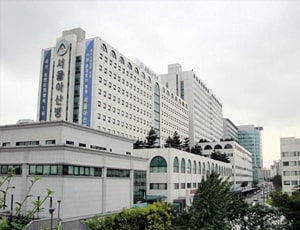
Asan Medical Centre located in Seoul, South Korea is accredited by ISO. Also listed below are some of the most prominent infrastructural details:

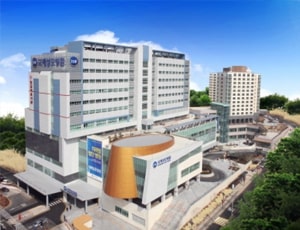
International St. Mary's Hospital located in Seoul, South Korea is accredited by JCI. Also listed below are some of the most prominent infrastructural details:
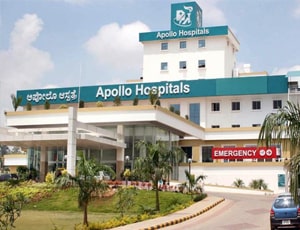
Types of Ovarian Cancer Treatment in Apollo Hospitals Bannerghatta and its associated cost
| Treatment Option | Approximate Cost Range (USD) | Approximate Cost Range (INR) |
|---|---|---|
| Ovarian Cancer Treatment (Overall) | 4409 - 8022 | 372838 - 648389 |
| Surgery | 3405 - 5556 | 281390 - 457925 |
| Chemotherapy | 332 - 911 | 28199 - 74573 |
| Radiation Therapy | 557 - 1113 | 46782 - 93097 |
| Targeted Therapy | 2848 - 4462 | 225734 - 366202 |
| Immunotherapy | 3374 - 5699 | 280587 - 455072 |
| Hormone Therapy | 917 - 1724 | 74872 - 138544 |
| Palliative Care | 337 - 564 | 27427 - 46212 |
DOCTORS IN 13 SPECIALITIES
FACILITIES & AMENITIES
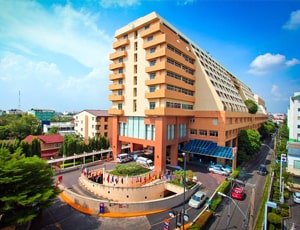
Types of Ovarian Cancer Treatment in Vejthani Hospital and its associated cost
| Treatment Option | Approximate Cost Range (USD) | Approximate Cost Range (THB) |
|---|---|---|
| Ovarian Cancer Treatment (Overall) | 9942 - 16600 | 359596 - 591853 |
| Surgery | 6759 - 11019 | 237068 - 396168 |
| Chemotherapy | 568 - 1672 | 19751 - 59578 |
| Radiation Therapy | 902 - 2295 | 31960 - 81304 |
| Targeted Therapy | 4516 - 7946 | 157747 - 279688 |
| Immunotherapy | 5534 - 10173 | 196643 - 368830 |
| Hormone Therapy | 1362 - 2860 | 47170 - 98865 |
| Palliative Care | 569 - 1139 | 20270 - 40652 |

Types of Ovarian Cancer Treatment in Fortis Hospital and its associated cost
| Treatment Option | Approximate Cost Range (USD) | Approximate Cost Range (INR) |
|---|---|---|
| Ovarian Cancer Treatment (Overall) | 4067 - 7119 | 332485 - 581708 |
| Surgery | 3050 - 5093 | 249993 - 415592 |
| Chemotherapy | 305 - 809 | 24959 - 66879 |
| Radiation Therapy | 506 - 1016 | 41417 - 83111 |
| Targeted Therapy | 2542 - 4050 | 207563 - 333726 |
| Immunotherapy | 3046 - 5097 | 249512 - 417790 |
| Hormone Therapy | 816 - 1519 | 66293 - 124555 |
| Palliative Care | 306 - 506 | 25067 - 41500 |
DOCTORS IN 12 SPECIALITIES
FACILITIES & AMENITIES
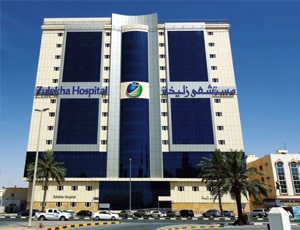
Types of Ovarian Cancer Treatment in Zulekha Hospital Sharjah and its associated cost
| Treatment Option | Approximate Cost Range (USD) | Approximate Cost Range (AED) |
|---|---|---|
| Ovarian Cancer Treatment (Overall) | 10618 - 17928 | 38608 - 66665 |
| Surgery | 7368 - 12575 | 27068 - 46310 |
| Chemotherapy | 675 - 1992 | 2514 - 7332 |
| Radiation Therapy | 1011 - 2793 | 3675 - 10487 |
| Targeted Therapy | 5037 - 9108 | 18248 - 32439 |
| Immunotherapy | 6306 - 11449 | 22911 - 40522 |
| Hormone Therapy | 1438 - 3105 | 5278 - 11790 |
| Palliative Care | 674 - 1345 | 2445 - 4879 |
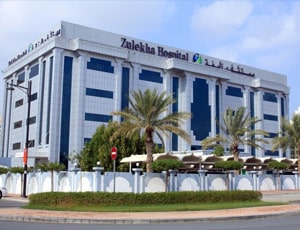
Types of Ovarian Cancer Treatment in Zulekha Hospital Dubai and its associated cost
| Treatment Option | Approximate Cost Range (USD) | Approximate Cost Range (AED) |
|---|---|---|
| Ovarian Cancer Treatment (Overall) | 10582 - 18209 | 38369 - 65658 |
| Surgery | 7154 - 12375 | 27028 - 44683 |
| Chemotherapy | 686 - 1993 | 2514 - 7490 |
| Radiation Therapy | 993 - 2755 | 3771 - 10361 |
| Targeted Therapy | 5102 - 8816 | 18675 - 33420 |
| Immunotherapy | 6080 - 11008 | 23046 - 41598 |
| Hormone Therapy | 1431 - 3138 | 5377 - 11465 |
| Palliative Care | 675 - 1340 | 2462 - 4893 |
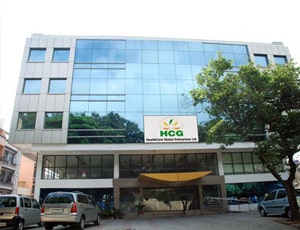
Types of Ovarian Cancer Treatment in HCG Kalinga Rao Road and its associated cost
| Treatment Option | Approximate Cost Range (USD) | Approximate Cost Range (INR) |
|---|---|---|
| Ovarian Cancer Treatment (Overall) | 4064 - 7125 | 333046 - 579959 |
| Surgery | 3057 - 5062 | 250407 - 414260 |
| Chemotherapy | 304 - 810 | 25084 - 66696 |
| Radiation Therapy | 508 - 1011 | 41764 - 83384 |
| Targeted Therapy | 2544 - 4069 | 209071 - 333412 |
| Immunotherapy | 3059 - 5085 | 249220 - 414381 |
| Hormone Therapy | 809 - 1520 | 66585 - 125194 |
| Palliative Care | 304 - 509 | 25085 - 41743 |
DOCTORS IN 3 SPECIALITIES
FACILITIES & AMENITIES

Types of Ovarian Cancer Treatment in Sarvodaya Hospital and Research Centre and its associated cost
| Treatment Option | Approximate Cost Range (USD) | Approximate Cost Range (INR) |
|---|---|---|
| Ovarian Cancer Treatment (Overall) | 4044 - 7135 | 332592 - 584005 |
| Surgery | 3052 - 5089 | 248586 - 415390 |
| Chemotherapy | 304 - 810 | 24868 - 66671 |
| Radiation Therapy | 506 - 1017 | 41525 - 83120 |
| Targeted Therapy | 2525 - 4080 | 208536 - 334100 |
| Immunotherapy | 3042 - 5099 | 250261 - 415989 |
| Hormone Therapy | 815 - 1523 | 66832 - 125364 |
| Palliative Care | 304 - 508 | 25054 - 41754 |
DOCTORS IN 14 SPECIALITIES
FACILITIES & AMENITIES
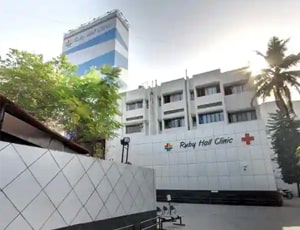
Types of Ovarian Cancer Treatment in Ruby Hall Clinic and its associated cost
| Treatment Option | Approximate Cost Range (USD) | Approximate Cost Range (INR) |
|---|---|---|
| Ovarian Cancer Treatment (Overall) | 3742 - 6572 | 311568 - 535775 |
| Surgery | 2810 - 4603 | 233078 - 386241 |
| Chemotherapy | 283 - 752 | 23214 - 61862 |
| Radiation Therapy | 475 - 921 | 38118 - 75989 |
| Targeted Therapy | 2324 - 3726 | 191221 - 303430 |
| Immunotherapy | 2812 - 4738 | 227641 - 377804 |
| Hormone Therapy | 740 - 1398 | 61927 - 115382 |
| Palliative Care | 277 - 471 | 23207 - 38462 |

Assuta Hospital located in Tel-Aviv, Israel is accredited by JCI. Also listed below are some of the most prominent infrastructural details:
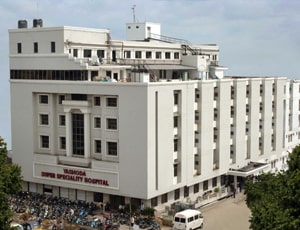
Types of Ovarian Cancer Treatment in Yashoda Hospital, Malakpet and its associated cost
| Treatment Option | Approximate Cost Range (USD) | Approximate Cost Range (INR) |
|---|---|---|
| Ovarian Cancer Treatment (Overall) | 4058 - 7087 | 332641 - 582296 |
| Surgery | 3036 - 5053 | 250897 - 414779 |
| Chemotherapy | 305 - 811 | 24877 - 66672 |
| Radiation Therapy | 509 - 1017 | 41786 - 83373 |
| Targeted Therapy | 2544 - 4071 | 207722 - 332159 |
| Immunotherapy | 3037 - 5087 | 249703 - 414307 |
| Hormone Therapy | 812 - 1519 | 66728 - 124704 |
| Palliative Care | 304 - 508 | 24897 - 41660 |
DOCTORS IN 10 SPECIALITIES
FACILITIES & AMENITIES
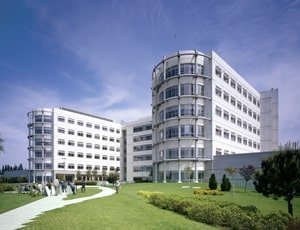
Types of Ovarian Cancer Treatment in Anadolu Medical Center and its associated cost
| Treatment Option | Approximate Cost Range (USD) | Approximate Cost Range (TRY) |
|---|---|---|
| Ovarian Cancer Treatment (Overall) | 6821 - 10306 | 207262 - 311568 |
| Surgery | 3901 - 6899 | 117300 - 203787 |
| Chemotherapy | 394 - 990 | 12061 - 31073 |
| Radiation Therapy | 667 - 1350 | 20675 - 40889 |
| Targeted Therapy | 3105 - 5028 | 94370 - 151051 |
| Immunotherapy | 3939 - 6650 | 119147 - 202745 |
| Hormone Therapy | 1033 - 1992 | 30917 - 61202 |
| Palliative Care | 397 - 671 | 11949 - 20498 |
DOCTORS IN 12 SPECIALITIES
FACILITIES & AMENITIES

Types of Ovarian Cancer Treatment in I.A.U VM Medical Park Florya Hospital and its associated cost
| Treatment Option | Approximate Cost Range (USD) | Approximate Cost Range (TRY) |
|---|---|---|
| Ovarian Cancer Treatment (Overall) | 6831 - 10067 | 206603 - 304944 |
| Surgery | 3965 - 6687 | 119399 - 201927 |
| Chemotherapy | 391 - 1012 | 11881 - 30312 |
| Radiation Therapy | 664 - 1333 | 19989 - 41428 |
| Targeted Therapy | 3177 - 5075 | 92841 - 153077 |
| Immunotherapy | 3935 - 6737 | 117489 - 205973 |
| Hormone Therapy | 1034 - 2039 | 31095 - 60525 |
| Palliative Care | 399 - 689 | 11610 - 20678 |
DOCTORS IN 15 SPECIALITIES
FACILITIES & AMENITIES
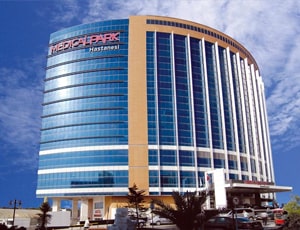
Types of Ovarian Cancer Treatment in Medical Park Bahcelievler Hospital and its associated cost
| Treatment Option | Approximate Cost Range (USD) | Approximate Cost Range (TRY) |
|---|---|---|
| Ovarian Cancer Treatment (Overall) | 6824 - 10177 | 199907 - 310234 |
| Surgery | 3943 - 6651 | 118823 - 205691 |
| Chemotherapy | 386 - 995 | 11664 - 30254 |
| Radiation Therapy | 663 - 1329 | 20257 - 41068 |
| Targeted Therapy | 3140 - 5111 | 93714 - 154376 |
| Immunotherapy | 3924 - 6771 | 119689 - 203792 |
| Hormone Therapy | 1005 - 2043 | 30236 - 60092 |
| Palliative Care | 389 - 688 | 11864 - 20199 |
DOCTORS IN 12 SPECIALITIES
FACILITIES & AMENITIES
Ovarian cancer is the abnormal growth of cells in the ovaries, which are an important part of the female reproductive system. Ovaries are two small glands, located on either side of the uterus. They help produce female sex hormones and store or release eggs. An ovarian tumor is it is the eighth most common type of cancer among women. It is the fifth most common cause of cancer deaths in women around the world. Ovarian cancer can be life-threatening if not diagnosed and treated on time, however, the chances of survival are great in the case of early diagnosis.
Ovarian cancer forms when normal ovarian cell growth fails, and there is an uncontrolled growth of cells. Most of the ovarian cancers arise from the lining cells (epithelium) of the ovary. The ovarian tumor can metastasize and spread to other organs of the body.
There is no identified and known cause of ovarian cancer. However, there are some risk factors associated with the disease. Family history (genetics) of ovarian cancer, older age, breast cancer, obesity, and endometriosis are some of the known ovarian cancer risk factors. Other than these, menstrual cycles play a major role in ovarian cancer. The higher the number of total lifetime ovulations, the greater the risk of ovarian cancer. That is, women who have had their periods before the age of 12 are at an increased risk of ovarian cancer.
The risk of ovarian cancer is also high in women suffering from familial melanoma, which is characterized by the presence of certain genes. These genes are inherited from parents and mostly occur when two or more relatives suffer from the aggressive form of melanoma or skin cancer.
The kind of ovarian cancer you have depends on where the cancer starts in the body. There are three main types:
Depending on the type, stage, grade of ovarian cancer, and general health of the patient, the oncologist will devise the best treatment plan for the patient. However, a patient’s expectations and desires play a major role in selecting the treatment plan. For example, some patients may desire childbirth in the future, while others could be okay with having their uterus. the Fallopian tubes and ovaries removed.
Surgery: Surgery is often the first and the best treatment for ovarian cancer. Surgical removal of the cancer is done in a vast majority of ovarian cancer patients. The type of surgery opted for depends upon how widespread the cancer is when it is diagnosed.
There are different surgical procedures to get rid of ovarian cancer, such as unilateral oophorectomy (removal of one ovary) or bilateral oophorectomy (removal of both ovaries), salpingectomy (removal of Fallopian tubes), hysterectomy (removal of the uterus), and omentectomy (removal of momentum).
Typically, the organ in question is fully removed in all these procedures. In some of the advanced cancers, complete removal of the cancer cells is not possible. In such cases, the possible amount of tumor is removed in a procedure called debulking surgery.
Chemotherapy: Chemotherapy drugs interfere with the cell division process and damage the DNA of the cancer cells to reduce their number and stop them from growing any further. Patients will often benefit greatly from its use in the case of ovarian cancer because ovarian cancer patients can tolerate it better because of fewer chemotherapy side effects.
In the case of ovarian cancer treatment, chemotherapy drugs can be given into the vein intravenously (IV) or placed directly into the abdomen (IP).
In some cases, chemotherapy may be performed first, followed by surgery. This is called neoadjuvant chemotherapy. Common chemotherapy drugs used to treat ovarian cancer include paclitaxel, cisplatin, topotecan, doxorubicin, epirubicin, and gemcitabine.
Drugs used in chemotherapy travel throughout the body and can also kill a few normal cells in the body, leading to unpleasant side effects. So, chemotherapy should be followed only if the patient can cope with it. Chemotherapy can cause anemia and leucopenia, besides vomiting, diarrhea, appetite loss, hair loss, and fatigue.
Radiation therapy: Radiation therapy uses high-energy X-rays or proton beams to destroy the tumors of ovarian cancer. This can be given as palliative therapy, or as adjuvant therapy combined with surgery or chemotherapy. However, radiation therapy alone does not improve the survival rate in people with well-differentiated cancers. Common side effects of radiotherapy treatment are diarrhea, constipation, and frequent urination.
Hormone therapy: Although estrogen alone does not have any effect on cancer, cutting off a supply of estrogen slows the growth of cancer cells. Hormone therapy can prevent estrogen from reaching the cancer cells, thus suppressing the growth of cancer.
Targeted drug therapy: Newer medications are being developed that can target cancer cells directly, but till now this treatment only helps reduce damage to the normal cells and subsidizes the side effects of chemotherapy.
The journey of recovery following ovarian cancer treatment can be both physically and emotionally challenging, particularly for those who have undergone a complete removal of ovaries and uterus. The abrupt onset of menopause can bring about various side effects, and adapting to life after ovarian cancer treatment may pose difficulties.
For individuals who have undergone surgery as part of their treatment plan, resuming activities such as driving after a month is generally feasible, but it is crucial to consult with the doctor at each stage before making any significant decisions.
Some women may experience challenges in focusing on daily tasks post-treatment. The impact of multiple cycles of chemotherapy and radiotherapy can contribute to a slower recovery. Adequate fluid intake becomes essential to aid in the recovery process and minimize the side effects of these treatments. Additionally, maintaining a well-balanced diet is equally crucial during the recovery period. Seeking guidance from healthcare professionals and adopting a holistic approach can help women navigate the recovery journey with greater ease and resilience.
Ask your healthcare adviser for the best multiple options and choose the one that meets your expectations
On an average, Ovarian Cancer Treatment in South Korea costs about $22800. Only some of the best and certified hospitals in South Korea perform Ovarian Cancer Treatment for international patients.
Different hospitals have different pricing policy when it comes to the cost of Ovarian Cancer Treatment in South Korea. The top hospitals for Ovarian Cancer Treatment in South Korea covers all the expenses related to the pre-surgery investigations of the candidate. The comprehensive Ovarian Cancer Treatment package cost includes the cost of investigations, surgery, medicines and consumables. Extended hospital stay, complications after the surgery or new diagnosis may affect the overall cost of Ovarian Cancer Treatment in South Korea.
There are many hospitals across the country that offer Ovarian Cancer Treatment to international patients. For quick reference, the following are some of the leading hospitals for Ovarian Cancer Treatment in South Korea:
While the speed of recovery may vary from patient to patient, they are still required to stay for about 21 days after discharge. During this time, the patient undergoes medical tests and consultations. this is to ensure that the treatment was successful and the patient us safe to return.
Apart from the cost of Ovarian Cancer Treatment, the patient is also required to pay additionally for daily meals and guest house accommodation. The per day cost in this case may start from USD 50 per person.
Some of the best cities in South Korea which offer Ovarian Cancer Treatment are:
After Ovarian Cancer Treatment, the patient is supposed to stay for about 5 days in the hospital for recovery and monitoring. This phase is important to ensure that the patient is recovering well and is clinically stable. During this time, several tests are performed before the patient is deemed suitable for discharge.
There are more than 2 hospitals that offer Ovarian Cancer Treatment in South Korea. The above mentioned clinics have the required infrastructure and a dedicated unit where patients can be treated. Also, these hospitals follow the necessary guidelines as required by the medical associations for the treatment of Ovarian Cancer Treatment patients.
Some of the renowned medical specialists for Ovarian Cancer Treatment in South Korea are: